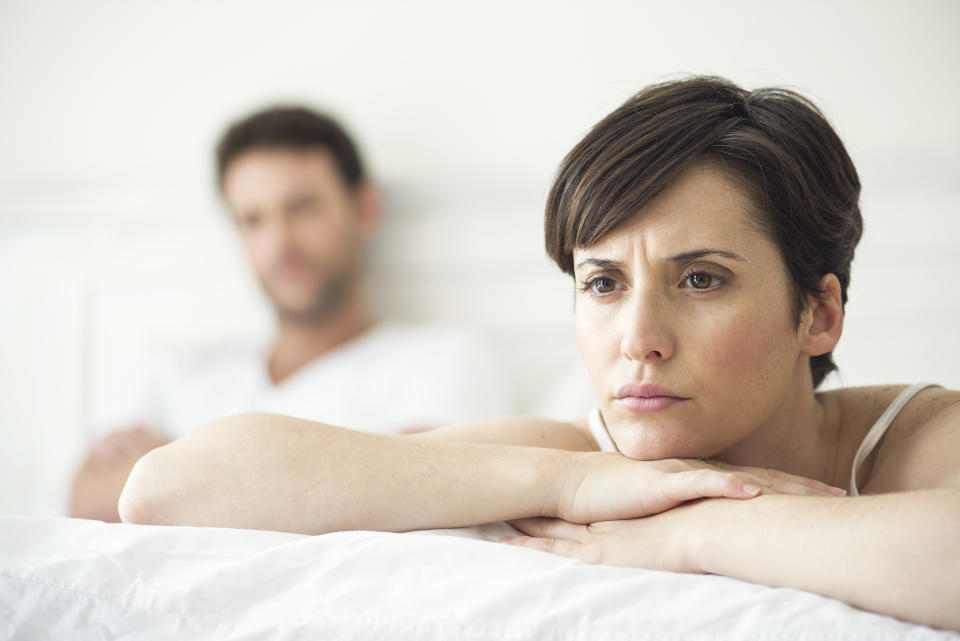How to enjoy sex during the menopause
![The menopause can affect a woman's sex life - yet it's rarely discussed [Photo: Getty]](https://s.yimg.com/ny/api/res/1.2/kVc0_r6ZhF3FJTI3_MPttg--/YXBwaWQ9aGlnaGxhbmRlcjt3PTEyNDI7aD04Mjg-/https://media-mbst-pub-ue1.s3.amazonaws.com/creatr-uploaded-images/2019-10/e59a2cc0-f18d-11e9-9e9f-333baa18d783)
The menopause brings everything from hot flushes and night sweats to insomnia and mood swings.
But its affect on a woman’s sex life is less commonly discussed.
Going through ‘the change’ often triggers vaginal dryness, which can make intercourse agonising.
Hormonal changes combined with sleepless nights and embarrassment over the ‘middle age spread’ also puts many off being intimate.
With today marking World Menopause Day, Yahoo UK asks experts how women can continue to enjoy sex while going through “the change”.
Menopause usually strikes between 45 and 55, however, one in 100 women experience symptoms at under 40, NHS statistics show.
Most endure symptoms for around four years, but one in 10 battle the discomfort for up to 12 years.
While many blush at the thought of vaginal dryness, menopause specialist nurse Kathy Abernethy warns it is “almost an inevitability”.
“Vaginal dryness comes about when the cells in the vagina change,” she told Yahoo UK. “The vagina is like a sponge; it gives during intercourse. Menopause makes it become rigid.”

The uncomfortable symptom affects a woman’s day-to-day life, with many enduring pain and itching when they walk or exercise. When it comes to sex, vaginal dryness can be agonising.
“It feels like sandpaper,” Ms Abernethy said. “You get a friction feeling when the penis should just glide in.”
READ MORE: 10 of the best menopause relief products
While uncomfortable for all, gynaecologist Dr Michael Savvas warns young menopausal women may particularly suffer.
“Hormone levels drop off more steeply in menopausal women under 40,” he told Yahoo UK. “It’s unnatural for a young woman to have low oestrogen or testosterone.”
While it may sound bleak, menopausal women do not have to wave goodbye to their sex lives.
“It's important to communicate with your partner that it’s an issue,” Ms Abernethy said.
“Lots of women are suffering in silence. Sex is not an open conversation but men don’t ‘get it’ until they’re told.”
Being open with your other half may also stop them blaming themselves, with many men feeling “shunned” when their partner turns down their advances, Ms Abernethy said.
When it comes to enjoying sex again, ramping up foreplay will not solve the problem.
READ MORE: Moody? Tired? Forgetful? You may be peri-menopausal – even in your 30s!
Ms Abernethy recommends women opt for vaginal lubricants, which can be bought on the high street.
Some may also benefit from the hormonal replacement therapy (HRT) vaginal oestrogen, which can come as a pessary, cream or vaginal ring. Unlike other forms of HRT, vaginal oestrogen has not been linked to cancer or blood clots.
Although both lubricants and vaginal HRT are effective, they do not cure vaginal dryness, with women relying on the treatments every time they have sex.
For the best results, it is important women seek help as soon as they experience discomfort.
“Vaginal dryness doesn’t get better on its own; treatment is required,” Ms Abernethy said.
Eating a diet rich in plant-based oestrogen may also help. Speaking to Yahoo UK, Tania Adib - a consultant gynaceologist at The Medical Chambers Kensington - recommended chickpeas, nuts and seeds.
“Limit your intake of alcohol as drinking over the safe recommended limit can lower oestrogen levels and lead to vaginal dryness as a result,” she added.
While vaginal dryness stops some menopausal women being intimate, for others, a low sex drive means they simply do not want to.
“Reduced libido affects lots of women,” Ms Abernethy said.
Hormonal changes are often to blame, with testosterone, which gives a woman her sex drive, falling during “the change”.
“It could also be caused by the ageing process,” Ms Abernethy said. “Women feel less sensual than they did when they were younger.
“Menopause symptoms like insomnia also leave women exhausted and not in the mood. And relationships can get stale in middle age.
“Hormonal changes and ageing also trigger abdominal weight gain, which often leaves women with low self esteem.”
To get back in the mood, Ms Abernethy first recommends women make sex comfortable, via lubricants or other treatments.
Testosterone therapies can then help them feel more passionate. Testosterone is not licensed for use in women in the UK, however, doctors can give it “off label”.
READ MORE: The menopause timeline: What to expect from each stage
“Doctors prescribe products licensed for men at a much reduced dose,” Dr Savvas said.
When given “appropriately”, very few develop “male characteristics”, like facial hair, he added.
As well as getting women in the mood, testosterone may also help women enjoy intercourse.
“Many report finding sex less pleasurable and finding it hard to orgasm, testosterone helps,” Dr Savvas said.
Vaginal oestrogen aside, the medic also recommends often forms of HRT, like tablets, patches and implants.
The treatment has hit the headlines over the years after links to breast, ovarian and womb cancer.
According to Dr Savvas, however, HRT is “extremely safe”, particularly for those with no personal or family history of disease.
In early-onset menopause, HRT could even keep women healthy, he adds. Experiencing “the change” too soon can trigger osteoporosis and heart disease, with oestrogen being linked to both bone and cardiovascular health.
For some, their libido returns post-menopause, but Ms Abernethy stresses a woman’s attitude to ageing is important.
“If you’re hankering after a 20 year old's body, it's not going to happen,” she said. “You should accept your 50-year-old body is still hugely attractive to your partner.”
To break down the stigma around sex during the menopause, Ms Abernethy urges people to discuss it more openly.
“Menopause is a natural part of our lives,” she said. It should be talked about.”


